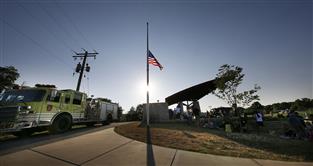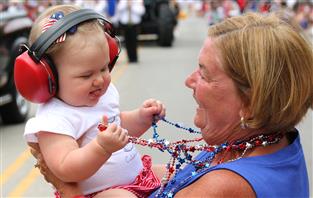Judge weighed murder charge, other factors, in deciding Sebena sentence
Sebena gets mandatory life sentence for killing his wife, with a chance for earlier release
The sentencing hearing of Benjamin Sebena in the shooting death of his wife, Wauwatosa Police Officer Jennifer Sebena, was conducted on the premise that her death was essentially a case of domestic violence.
Tosa Police Chief Barry Weber doesn't see it that way.
"I truly believe one of the reasons Jennifer (Sebena) was killed was because she was a police officer," Weber said after last week's trial. "I think her husband hated that fact."
Sebena's war injuries disqualified him for service as a firefighter or police officer, Judge David Borowski said. "So there may have been certainly envy or some level of jealousy" of his wife's success as an officer.
Still, Borowski said in court, "I really don't think Mr. Sebena killed Jennifer because she was a police officer."
Sebena last week received the mandatory sentence of life in prison for a conviction of first-degree intentional homicide. The only question in front of Judge David Borowski was how long Sebena would serve before he became eligible to apply for release under extended supervision. The minimum under law is 20 years, which was suggested by defense attorney Michael Steinle. The maximum is no eligibility for release. Prosecutor Mark Williams recommended 50 to 60 years.
Borowski, making clear that an application for release doesn't mean it will be granted, set it at 35 years. If Sebena is released then, he would be 65.
The argument over how long Sebena would serve before becoming eligible for release was a peek in miniature at the trial that, because Sebena confessed, never was.
Two views of the case
Sebena's possible envy of his wife's job, and his possible jealousy of attention given her by other men — normal human emotions — were motives put forward by prosecutor Mark Williams. Defense attorney Michael Steinle emphasized Sebena's abnormal past, including a traumatic brain injury suffered in warfare and a case of post-traumatic stress disorder that psychiatrist Kenneth Robbins called one of the worst he'd ever seen.
In a long explication of the case, Borowski weighed the heinousness of the crime — stalking his wife over a couple of days, shooting her in the back of the head, then disfiguring her by shooting her in the face several times — against what he called mitigating factors. Half a dozen times he flipped from the crime to mitigating factors and back to the crime again.
For the judge, the fact that Sebena confessed, accepted responsibility and saved the state a trial were benefits. A general leniency to veterans established by the Supreme Court was another, as was his clear remorse and his comportment in jail. Also, Sebena knew that he was affected by his wartime service and sought out services. For Borowski, the most moving parts of his background seemed to be his experiences in the military.
Troubling experiences
Sebena had killed 68 people in Iraq, Borowski said. The judge outlined some instances taken from his pscychological report.
According to a letter written by a military colleague, a convoy including Sebena came under intense fire from the side of the road and also from a nearby house. The Marines took up defensive positions and called in airstrikes on the house.
"Mr. Sebena was involved in the coordination and the firing. All rounds successfully landed on the house, killing all the occupants," the colleague related.
Inside the house, a squad found that there were dozens of women and children killed along with the combatants, and determined that the women and children had been ordered to fire or risk execution.
"This same letter-writer talks about the defendant and others being given the, as he says, grisly task of cleaning blood and the human remains of friendly casualties off of vehicles and equipment," the judge said. This possibly included the remains of friends, he said.
Meeting a young boy
In another case, in "one of the most troubling memories that Ben suffered," Borowski said, reading from the psychological report, Sebena befriended a 7- or 8-year-old boy who had lost his father in the war. Sebena spent time with him, meeting with him and teaching him English. Sebena believed the boy was appreciative and that they "developed a bit of a relationship."
One day, Sebena and others were rounding a corner and encountered a boy with a rifle, shooting at them. Sebena and the others shot back and killed the boy, who turned out to be the boy Sebena had befriended.
They went to the building where the boy lived, and saw that his mother was being held by a man with a knife at her throat, Borowski read. When the men saw the Marines approach, they stabbed the woman, killing her, and Sebena and the other Marines opened fire and killed the men.
"Mr. Sebena basically did come back as messed up as you can come back," Borowski said.
Killing is not the answer
Still, the judge said, "No matter what your history is, no matter how bad your trauma is, how much PTSD you suffered ... you just don't go out and kill a member of your family, you don't go out and kill anyone."
He added: "Mr. Sebena, you basically brought an act of war to Wauwatosa. You ambushed your wife, killed her in cold blood. She had no ... mobility to defend herself, no ability to talk you out of the terrible terrible violence."
After Sebena was arrested, investigators found many Post-It notes covering the refrigerator and doors. They were written by Jennifer. One said, "My darling, I can't wait to kiss and snuggle you when I get home." Another said, "Remember to talk to God. I love you very much." Another said, "You make me happy — I'm very thankful to be your wife." And another: "Baby, you're my everything, I love every day that I'm with you, you're my whole world, I miss it already, I can't wait to see you in the morning. I love you."
"They express to me a great deal of devotion, sentiment and, frankly, love from the victim in this case to the defendant," Borowski said.
Mothers speak out
Ben Sebena's mother, Linda Sebena, spoke at the hearing, making a plea for better services that reintroduce men who had learned how to kill back into society.
"In many ways, Jen was another casualty of war," she said, seeking mercy for her son.
Violet Gerhat, Jennifer's mother, described being informed by police officers on Christmas Eve morning that her daughter was dead. The next day, the funeral home called, and she asked to see the body, but was told the condition of her daughter's body was so horrific she should not see it.
"She has no face, is all I conclude," she said.
She asked for a lock of her hair, to give to Jennifer's husband. A day later she learned that he was the suspect.
"A husband is supposed to love and protect his wife, not ambush and kill her," she said.
Last words
Ben Sebena was the last to speak before the judge took his turn.
"I'm sorry I took away your daughter, I'm sorry I took away your sister," he said, his voice emotional, to Jennifer Sebena's family. "If I could replace my own (life) for hers right now, I would do it. I don't know what to say, really."
To the judge, he said, "You're going to make your choice, it's your decision. But right now I know for a fact that for the rest of my life I'm living in a prison for taking my wife, for taking away the one love of my life."
"I ask for forgiveness," he said, "and I hope to God that he gives it to me."
More from News and Features
- Anodyne Coffee plans to open location in Wauwatosa Village
- Wauwatosa Meetings: Aug. 4
- Video: Wauwatosa girl's curbside ice cream stand raises money for the hungry
- Wauwatosa News and Notes: Hands-only CPR training offered; Firefly Art Fair is Aug. 6-7
- Wauwatosa Ask Now: Why are there barriers and fencing along the North Avenue bridges over the Menomonee River?
- Mystery Photo Contest: July 28
- Wauwatosa gears up for National Night Out event, this year at the zoo
- Election 2016: Wisconsin's 4th District candidates weigh in
- Wauwatosa's Luther Manor residents share smiles through flower delivery
- Wauwatosa Police Report: July 17-23















